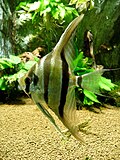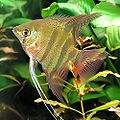Pterophyllum
Pterophyllum is a small genus of freshwater fish from the family Cichlidae known to most aquarists as "angelfish". All Pterophyllum species originate from the tropical regions of the Amazon Basin, Orinoco Basin, and various rivers in the Guiana Shield in South America. They are a popular choice for aquariums due to their unique shape and interesting behaviors but require specific care to thrive in captivity.
Description[edit]
Pterophyllum species are distinguished by their laterally compressed bodies, long dorsal and anal fins that give them their characteristic angel-like shape, and their slow, graceful movements. They can grow up to 6 inches (15 cm) in length in the wild, but aquarium specimens often reach larger sizes due to controlled conditions. Their coloration varies among species and can include a range of patterns and hues, from silver with black vertical stripes to more elaborate and colorful designs in captive-bred varieties.
Habitat[edit]
In the wild, Pterophyllum species are found in slow-moving or standing water with dense vegetation and a soft, sandy bottom. They prefer areas with plenty of hiding spots and subdued lighting. The water in their natural habitat is typically acidic to neutral pH and soft to moderately hard.
Behavior[edit]
Angelfish are known for their peaceful demeanor but can become territorial, especially during breeding. They are social fish that prefer to live in groups, although they establish a pecking order within their community. Their diet in the wild consists mainly of small invertebrates and plant matter, but in the aquarium, they can be fed a variety of foods, including flakes, pellets, and live or frozen foods.
Breeding[edit]
Pterophyllum species are oviparous, with females laying eggs on a flat surface, which are then fertilized by the male. The parents often guard their eggs and fry aggressively. In the aquarium, breeding angelfish can be a rewarding experience, but it requires maintaining optimal water conditions and providing the right diet to ensure the health of the parents and the fry.
Species[edit]
The genus Pterophyllum comprises three recognized species:
- Pterophyllum scalare (the most common species in the aquarium trade)
- Pterophyllum altum (known for its larger size and more demanding care requirements)
- Pterophyllum leopoldi (the smallest and least common species)
Aquarium Care[edit]
To successfully keep Pterophyllum species in an aquarium, it is essential to mimic their natural environment as closely as possible. This includes maintaining water temperature between 76°F and 86°F (24°C to 30°C), pH between 6.0 and 7.5, and soft to moderately hard water. Regular water changes, a well-filtered tank, and a diet that meets their nutritional needs are also crucial. Angelfish thrive in planted aquariums with plenty of space to swim and vertical structures or plants to hide among.
Conservation[edit]
While Pterophyllum species are not currently listed as endangered, their habitats are threatened by deforestation, pollution, and hydroelectric projects. Conservation efforts are necessary to ensure the survival of these unique fish in the wild.
-
Pterophyllum
-
Pterophyllum
-
Pterophyllum
-
Pterophyllum
-
Pterophyllum
-
Pterophyllum
-
Pterophyllum
-
Pterophyllum
-
Pterophyllum
-
Pterophyllum
-
Pterophyllum
-
Pterophyllum
Ad. Transform your life with W8MD's Budget GLP-1 injections from $75


W8MD offers a medical weight loss program to lose weight in Philadelphia. Our physician-supervised medical weight loss provides:
- Weight loss injections in NYC (generic and brand names):
- Zepbound / Mounjaro, Wegovy / Ozempic, Saxenda
- Most insurances accepted or discounted self-pay rates. We will obtain insurance prior authorizations if needed.
- Generic GLP1 weight loss injections from $75 for the starting dose.
- Also offer prescription weight loss medications including Phentermine, Qsymia, Diethylpropion, Contrave etc.
NYC weight loss doctor appointmentsNYC weight loss doctor appointments
Start your NYC weight loss journey today at our NYC medical weight loss and Philadelphia medical weight loss clinics.
- Call 718-946-5500 to lose weight in NYC or for medical weight loss in Philadelphia 215-676-2334.
- Tags:NYC medical weight loss, Philadelphia lose weight Zepbound NYC, Budget GLP1 weight loss injections, Wegovy Philadelphia, Wegovy NYC, Philadelphia medical weight loss, Brookly weight loss and Wegovy NYC
|
WikiMD's Wellness Encyclopedia |
| Let Food Be Thy Medicine Medicine Thy Food - Hippocrates |
Medical Disclaimer: WikiMD is not a substitute for professional medical advice. The information on WikiMD is provided as an information resource only, may be incorrect, outdated or misleading, and is not to be used or relied on for any diagnostic or treatment purposes. Please consult your health care provider before making any healthcare decisions or for guidance about a specific medical condition. WikiMD expressly disclaims responsibility, and shall have no liability, for any damages, loss, injury, or liability whatsoever suffered as a result of your reliance on the information contained in this site. By visiting this site you agree to the foregoing terms and conditions, which may from time to time be changed or supplemented by WikiMD. If you do not agree to the foregoing terms and conditions, you should not enter or use this site. See full disclaimer.
Credits:Most images are courtesy of Wikimedia commons, and templates, categories Wikipedia, licensed under CC BY SA or similar.
Translate this page: - East Asian
中文,
日本,
한국어,
South Asian
हिन्दी,
தமிழ்,
తెలుగు,
Urdu,
ಕನ್ನಡ,
Southeast Asian
Indonesian,
Vietnamese,
Thai,
မြန်မာဘာသာ,
বাংলা
European
español,
Deutsch,
français,
Greek,
português do Brasil,
polski,
română,
русский,
Nederlands,
norsk,
svenska,
suomi,
Italian
Middle Eastern & African
عربى,
Turkish,
Persian,
Hebrew,
Afrikaans,
isiZulu,
Kiswahili,
Other
Bulgarian,
Hungarian,
Czech,
Swedish,
മലയാളം,
मराठी,
ਪੰਜਾਬੀ,
ગુજરાતી,
Portuguese,
Ukrainian










